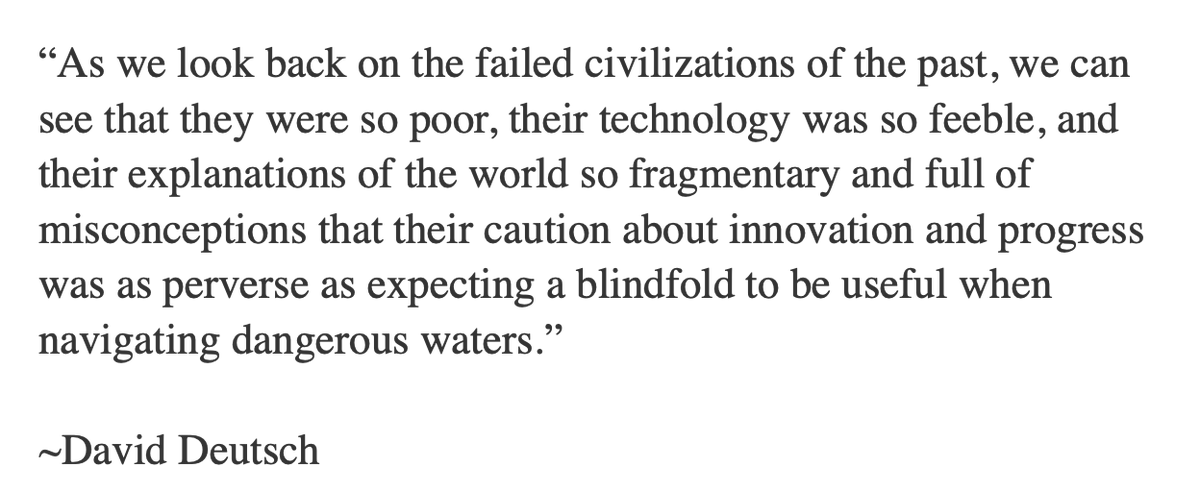
1/ Book recommendation with a discussion of Optimism versus Pessimism, a thread, Part One
Nullius in Verba (take nobody’s word for it.)
~Horace
amazon.com/Beginning-Infi…
Nullius in Verba (take nobody’s word for it.)
~Horace
amazon.com/Beginning-Infi…
2/ For much of human history, when someone wanted to figure out *why* something was the way it was, they often heard the same answer “The Gods did it.”
@DavidDeutschOxf, in his seminal book “The Beginning of Infinity: Explanations That Change the World” argues that’s
@DavidDeutschOxf, in his seminal book “The Beginning of Infinity: Explanations That Change the World” argues that’s
3/ why humans made so little progress over much of unrecorded and recorded history. Generation after generation were born, lived and died under the same “rules” and bad explanations such that one could conceivably be born 200 years after a great, great-grandfather and yet
4/ hold the same views, opinions and outlook as that ancient grandfather.
Such a world lives in a constant, grinding state of stasis, which, in most instances is a self-imposed prison under the guise of “The Precautionary Principle,” which advises against the introduction
Such a world lives in a constant, grinding state of stasis, which, in most instances is a self-imposed prison under the guise of “The Precautionary Principle,” which advises against the introduction
5/ of new ideas, methods or processes whose ultimate effects are unknown at the time of invention and which could be dangerous or even fatal to our species. One needn’t be too well versed in history to see that this principle was championed by the Authorities and elites of those
6/ societies, both secular and religious, as the desire to maintain a hold on power is often very much at odds with innovative ideas and explanations that might sweep an ancient regime or doctrine away. Disobedience often extracted the humiliation of one’s self and family and
7/ associates and ended in a very painful public death after being branded a heretic and apostate. That’s a pretty daunting roadblock to anyone trying to come up with better explanations that lead to improving conditions for humankind.
8/ Deutsch argues persuasively that it wasn’t until The Enlightenment, which he describes as “specifically a rebellion against authority in regard to knowledge” took a firm control over society’s beliefs that a framework for asking and answering questions without the fear of
9/ death allowed for the beginning of our ascent toward the vastly more advanced society we enjoy today. He argues that at a minimum, the social environment for good explanations to emerge must be:
~Tolerant of dissent and acceptance of and encouragement of criticism;
~Tolerant of dissent and acceptance of and encouragement of criticism;
10/ ~Open to change;
~openly distrustful of Dogma and Authority and
~ Accepting of aspirations to progress both by individuals and for the culture as a whole.
The second requirement—an openness to change—seems to me to *require* an optimistic outlook, which I'll focus on here.
~openly distrustful of Dogma and Authority and
~ Accepting of aspirations to progress both by individuals and for the culture as a whole.
The second requirement—an openness to change—seems to me to *require* an optimistic outlook, which I'll focus on here.
11/ Deutsch begins his chapter on Optimism with this quote from Karl Popper, One of the 20th century's most influential philosophers of science and argues that while “both the future of civilization and the outcome of a game of Russian roulette are unpredictable” they are 

12/ nevertheless very different. Whereas the outcome of Russian roulette is random, we do know the odds and probable outcomes of the game if fairly played, whereas “the future of civilization is *unknowable*, because the knowledge that is going to affect it has yet to be created”
13/ He quotes an 1894 speech by the physicist Albert Michelson, in which he says that all the important laws and facts of have already been discovered, so in the future we will just be arguing about how many decimal points that a theory was “off” by—quite a whopper in retrospect. 

14/ But Deutsch is careful to distinguish between *blind* optimism, which proceeds in a “whistling past the graveyard” manner and simply assumes bad things won’t happen and what I call rational optimism, which assumes that all sorts of unforeseen and bad outcomes will happen,
15/ but that if we apply our growing knowledge to solving them, we have a high probability of doing so and in creating “better” problems and “better” solutions.
He contrasts this with the idea of “blind pessimism” often called the precautionary principle which argues we can
He contrasts this with the idea of “blind pessimism” often called the precautionary principle which argues we can
16/ only ward off disaster by avoiding everything not known to be safe. He then details why a pessimistic theory is seductive—it hijacks some of deepest human programing to be extra alert to dangers, especially novel ones and it’s prognosticators always promise that they will
17/ happen imminently, with the general result being a cataclysmic destruction of human civilization. Starting with Thomas Malthus and continuing to the various doomsayers of today, whose continued premonitions of apocalypse would require several extra threads to simply list.
18/ Importantly, when that disaster fails to occur by the given date, the doomsayers often simply change the date and double down on doom. Deutsch correctly points out that many civilizations in history HAVE collapsed and
19/ disappeared, but most likely could have been avoided “if only they had possessed a little additional knowledge, such as improved agriculture or military technology, better hygiene, or better political or economic institutions.” 

20/ A rational optimist sees that “problems are inevitable” and that we must always face trying to plan for an unknowable future.
In my next thread, I’ll look at why it's difficult for people to understand the idea that future knowledge is inherently unknowable and
In my next thread, I’ll look at why it's difficult for people to understand the idea that future knowledge is inherently unknowable and
21/ unpredictable, and how this often causes great consternation and worry over the idea that we can't even seem to solve our *current* problems (which is a misunderstanding of all of the real progress we've made)so how are we *ever* going to solve these potentially
22/ serious, and (our imaginations whisper) deadly problems that we don't even know about or understand.
But we can, and we *must* overcome our unease if we are to remain forever at "The beginning of infinity" and I'll suggest some ways that Deutsch thinks we can do so.
But we can, and we *must* overcome our unease if we are to remain forever at "The beginning of infinity" and I'll suggest some ways that Deutsch thinks we can do so.
• • •
Missing some Tweet in this thread? You can try to
force a refresh





